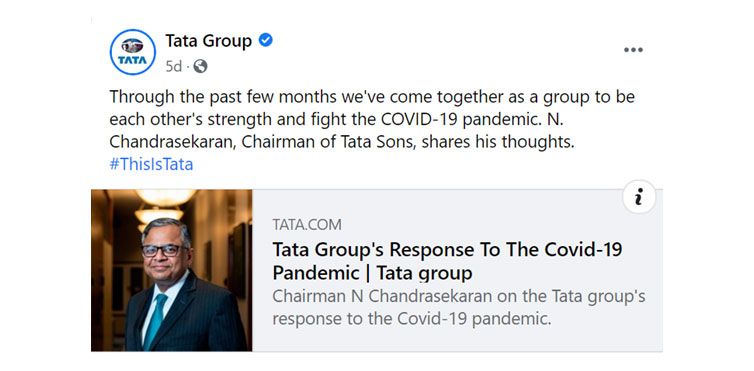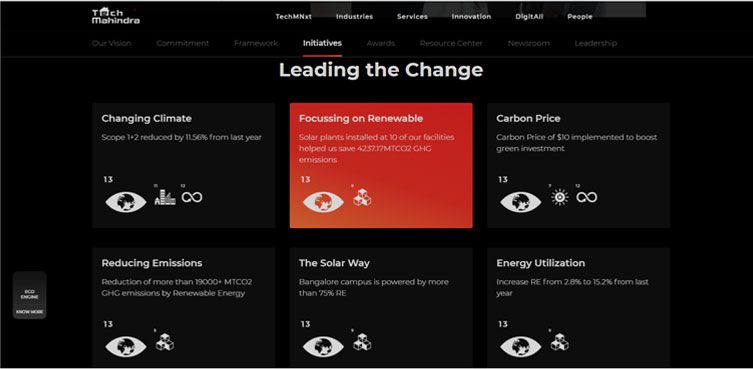
While the Covid-19 crisis has impacted organisations across the globe, it has also brought sustainability to the fore of business strategy discussions. The pandemic has heightened stakeholders’ sensitivity towards sustainability. Now, more than ever, is when your stakeholders want to know:
- How good is your company in dealing with a crisis?
- How much do you give back to the community?
- How do you deal with climate change?
- What is the strategy for future-proofing the business?
While your company might be doing great work on the sustainability front, it’s crucial that your consumers know about it. There’s a strong business connect to sustainability communication.** A Google report indicates that two-thirds of consumers are willing to pay more for sustainable brands.**
Here are some visual examples of the What, Why and How of sustainability communication aimed at stakeholders. For more details, please [contact solutions@ticworks.com](mailto:contact solutions@ticworks.com).
WHAT
Covid: Companies talked about how they rose to support the nation and their communities in the fight against the pandemic.
N Chandrasekaran spoke about the Tata Group’s response to the Covid pandemic — from committing Rs 1,500 crore to relief measures to distributing over two million meals to healthcare professionals and migrant workers.

The Aditya Birla Group released videos on how they worked with the community to set up Covid facilities and enable production of lakhs of masks, food distribution, awareness camps, etc. They also addressed Covid positively on their social media pages.
Climate change: Thought leadership on climate action, alignment on the UN Sustainable Development Goals, and environment best practices draw eyeballs.
Tech Mahindra reaffirmed the science-based commitment of achieving net-zero carbon emissions by signing the UN Global Compact Initiative Statement on Climate Action. It aims to use new-age technologies like internet of things, artificial intelligence and blockchain to reduce its carbon footprint and conserve energy.

Hindalco has adopted biodiversity management to promote responsible mining and showcases unique initiatives at its Bagru mine to demonstrate how mined land can be rejuvenated.
Community as stakeholder: Initiatives that promote inclusion, accessibility, social justice and sustainable development help to humanise the company.
Ambuja Cement Foundation has set up 33 Skill and Entrepreneurship Development Institutes (SEDIs) across India, which have provided vocational training for over 65,000 rural youth (including more than 260 physically abled youngsters) and enabled over 18,189 entrepreneurs.
Tata Trusts speaks about how over 25,000 households have benefited from an initiative by its associate organisation -- Himmotthan – which rejuvenates water sources in Uttarakhand through technology.
WHY
Four reasons to spotlight sustainability initiatives
- Because it captures global attention!
The World Business Council of Sustainable Development calls out sustainable companies saying: “All our member companies are deeply committed to transforming their businesses and establishing sustainable practices throughout their supply chain:
- Aditya Birla Group’s extensive work on ‘<20C Futures’ and how businesses must fundamentally alter and adjust processes to survive in a hotter world and ensure resilience.
- Godrej Group’s ‘Greener India’ initiative ensures environmental sustainability is a key part of the entire value chain. They have succeeded in reducing the specific GHG emissions by 51% and more than half of their energy consumption is from renewable sources.
- ITC’s landmark e-Choupal has successfully created a more efficient supply chain and tackles issues such as fragmented farms, weak infrastructure and the involvement of numerous intermediaries.
2. Because there is a direct correlation to performance!
The Guardian has this to say: “There is an increase in evidence that actively investing in sustainable practices helps business thrive. An example is provided by the Dow Jones Sustainability Indices, a series of benchmarks assessing the sustainability of companies around the world. Research has repeatedly shown that those at the top end of the benchmark outperform those at the bottom.”
3. Because customers want this information!
The Global Web Index reports that consumers track sustainable brands: “Biodegradable packaging. Low-emission transport. Sustainably-sourced food. Consumers are calling for brands to take greater responsibility for the environment. 42% of U.S. and UK consumers say products that use sustainable materials are important in their day-to-day purchasing.”
4. Because it impacts brand perceptions!
Interbrand calls out the impact on brand valuation: “There are some direct benefits, such as: compliance with an increasingly rigorous legislation; cost savings derived from optimization of production lines and supply chains to reduce energy consumption; reduction in CO2 emissions; desire for more ethical products; and simply satisfying an emerging and cynical green consumer. But most importantly, incorporating sustainability as a business practice will not only increase companies’ brand value, but guarantee a long life for the business.”
HOW
Interesting content formats for sustainability
Microsites to highlight the subject
White papers build thought leadership
Authored articles build reputation
Videos help improve engagement and can be used to increase social engagement
Infographics make numbers interesting
Leadership interviews to drive through the point that the thought of sustainability comes from the very top
Print options — reports and brochures — add longevity
Case studies to prove your point
Newsletters to engage with the audience and drive conversations
We can do all of these for you and more.
Talk to us @ +91 8425814016/17 and let us know how we can support you in building a sustainability content portfolio for your brand.





